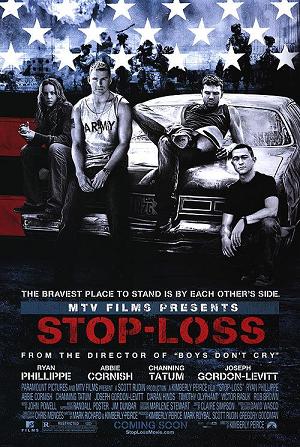
Main Page
Interviews Menu
Alphabetical Menu
Chronological Menu


Kimberly Peirce directs and co-writes Stop-Loss, a provocative and gripping drama about Brandon King (Ryan Phillippe), a U.S. soldier who, upon returning to Texas from completing his tour of duty in Iraq, receives a "stop-loss" letter that summons him back to duty. Steve (Channing Tatum), his best friend, is also stop-lossed, but, unlike Brandon, doesn't try to challenge the summons. Meanwhile, Brandon goes on the run from authorities with Steve's girlfriend, Michele (Abbie Cornish), in hopes of seeking help from a senator in Washinton, D.C. The relatively unknown term "stop-loss" (a.k.a. "Back Door Draft") literally means: "The retention of soldiers in the service beyond their expected term." Kimberly Peirce has perviously directed and co-written Boys Don't Cry, which garnered its lead actress, Hilary Swank, a well-deserved Academy Award. I had the privalege to interview Kimberly Peirce. Paramount Pictures releases Stop-Loss on March 28th, 2008. NYC MOVIE GURU: Where did you first learn about the term “stop-loss”? KP: It was from a patriotic soldier that I found out about “stop-loss.” We were [instant messaging] and he said, “Do you want to hear something fucked-up?” and I always want to hear something fucked-up. Fucked-up is interesting. I didn’t know what that means and he said that it’s a “backdoor draft.” They’re recycling the soldiers who have done their time and should be getting out and it’s a military term. It’s so interesting to me because the soldiers, [at least 81,000], are stop-lossed, [and] the families are stop-lossed. In a way, America is stop-lossed, [too], because they’re just recycling those resources that need to be utilized in a better way. Clearly, we need to figure out some solution. NYC MOVIE GURU: Was the film centered on the term “stop-loss” from the very beginning of your writing process? KP: No, it wasn’t at all. It started as [an agenda] to understand the soldiers and the emblematic story of this generation. It was really a story about these two best friends who were being cleaved apart by the fact that one of them, [Brandon], came-of-age during the war and he realized he doesn’t want to go back and wants to move on. The other one, [Steve], was so profoundly changed by the war, that he couldn’t come home. Their lives could no longer be as simple as they were before the war. NYC MOVIE GURU: What did you find interesting about “stop-loss”? KP: It maximizes all the problems that everyone has been going through. When the system does that to Brandon, we wanted it to be a moment that he says something that he never said in his life [and] never imagined saying. It’s a true expression of how he feels, but it’s not intellectualized. He spends the rest of the journey catching up with his emotions. We needed it to be an irrational moment. NYC MOVIE GURU: What was it like choosing a location to shoot the film? KP: We looked at shooting in Spain, Mexico, and Texas because that would have been a lot cheaper. They tried to get me shooting on the Alamo set, which wouldn’t have worked. I was very happy that the studio spent the money because it is an expense to go to Morocco. I wanted to shoot in an Islamic country. It’s always important to me to get it as culturally accurate as possible. I learn things whenever I’m on a location. I hang out with the people get to know what the vibe is like. We made a choice to shoot in Marrakesh because it’s a city and we’re representing urban combat. We also wanted it to feel very confined which is why we loved it when we found this community which has these buildings that end up creating narrow alleyways. That’s a great metaphor for what’s happening to the soldiers. [It] allowed us to bring the humvees in. What’s important to this war is that the soldiers form a unit together and they move in unison. NYC MOVIE GURU: Why did you choose Texas as Brandon’s home state? KP: I love Texas because it symbolizes a, sort of, emblematic Americana. I could have the homecoming parade there; if I had it in New York City, it wouldn’t be real. I could have the flag waving and it’s not mocking them. NYC MOVIE GURU: What are the similarities and differences between Stop-Loss and your last film, Boys Don’t Cry? KP: This is probably a higher class of people. They’re both stories about masculinity. [In Boys Don’t Cry, the main character] is trying to construct herself as a man to get love and acceptance. Even if you’re a man, you’re always dealing with masculinity. It comes naturally, but men are often in the process of shaping their masculinity which is what the boys in Stop Loss are doing. There’s a lot of really deep connection between boys and [there’s] a quest for identity. When Brandon says, “Fuck the President!”, he’s entering a new fold of his life of self-awareness. NYC MOVIE GURU: How do you feel about the scene when Brandon confronts the military officer and says, “Fuck the President!”? KP: It was a very delicate scene. It’s not a scene that I take lightly. [Since] this is a movie from the soldiers’ point-of-view, I wanted to make sure it’s honest and accurate to them. We didn’t want a guy who suddenly becomes a political activist who suddenly had an agenda because that wouldn’t have been truthful to soldiers. I interviewed a number of soldiers about that scene and we were very clear in setting up the circumstances that it had to be a very patriotic guy who’s signed up for, what he thinks, is all the right reasons to protect his family, his home and his country. He [finally] gets over there and realizes it wasn’t about anything that [he] signed up for. Instead of being in the desert and fighting the enemy they thought they were fighting, they were in the bedrooms, hallways and kitchens and it was impossible to not kill innocent people, not have our men killed [or] injured. It’s about camaraderie and we had to take him all the way there, so that’s why you need to see that opening battle scene. That’s why he wants to come home. I’ve always had a sense that if it was World War II and the country needed him, this guy would go right back [into the army], but [in this case], something didn’t see right to him. NYC MOVIE GURU: Do primarily intend to inform people about “stop-loss” through this story? KP: I want you to emotionally connect with [the characters]. I don’t have the agenda of exposing stop-loss; I have the agenda of moving you. “Stop-loss” happened to be very moving to me. It was a tool. Of course I want people to know what stop-loss is, but I came more from old-fashioned entertainment. Main Page Interviews Menu Alphabetical Menu Chronological Menu ______________________________________________________ |
The NYC Movie Guru
themovieguru101@yahoo.com
Privacy Policy